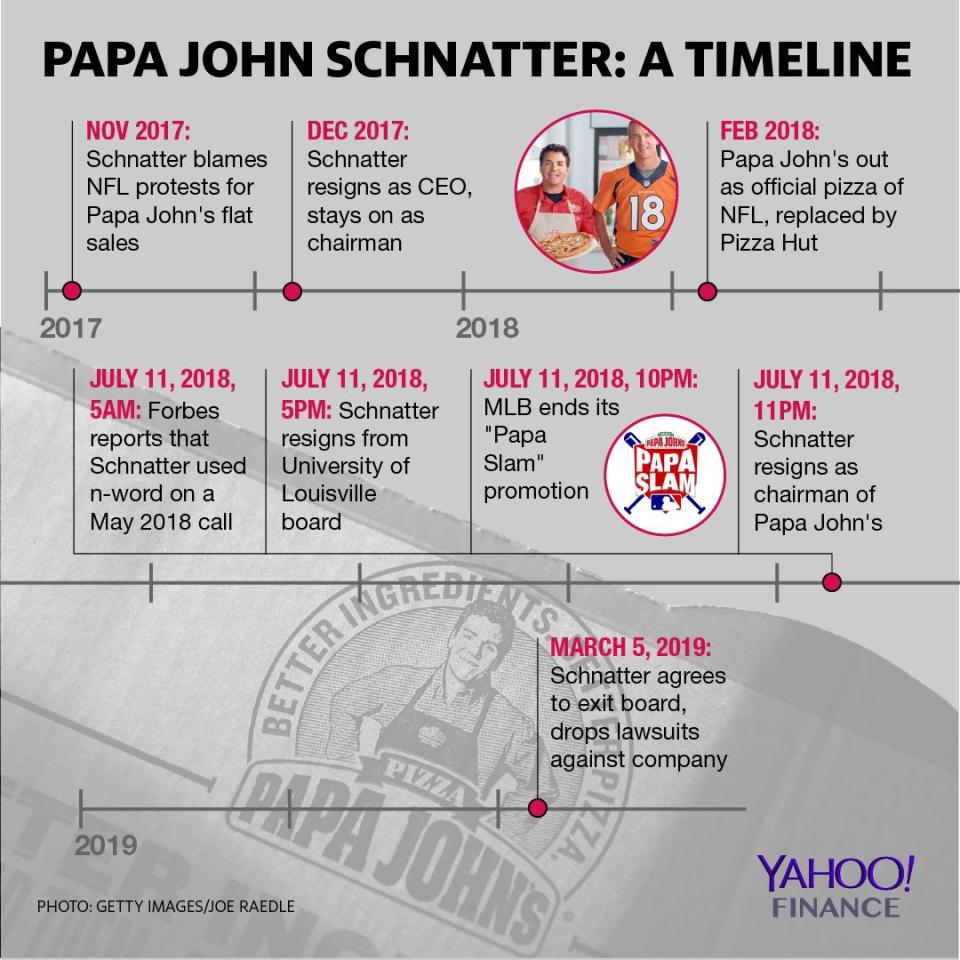Papa John's vs Papa John: A timeline
“Papa” John Schnatter has agreed to exit the Papa John’s board entirely before the company’s 2019 shareholder’s meeting in May. The company has agreed to replace him with a new board member unaffiliated with activist hedge fund Starboard Capital.
Schnatter is also dropping two active lawsuits against the company.
The settlement marks the end of an exhausting and ugly public battle between Schnatter and the board of the company he founded in 1984.
In a statement, Schnatter said, “I founded Papa John’s, built it from the ground up and remain its largest shareholder. I care deeply about its employees, franchisees, and investors and am thankful that I’ve been able to resolve these important issues, and that we can all focus on the Company’s business without the need for additional litigation.”
Schnatter was CEO of his company as recently as November 2017—just over one year ago. By May, he won’t even be on its board.
How did he get here?

Schnatter’s two massive missteps both happened on phone calls.
In November 2017, Papa John’s reported its Q3 earnings. The report showed flat same-store sales growth, which was below analyst expectations. On the earnings call, Schnatter blamed the flat sales on the NFL player protests led by Colin Kaepernick.
Schnatter, in fact, mentioned the NFL 44 times on that earnings call, Bloomberg counted. (Papa John’s was the “official pizza” of the NFL.) He told everyone on the call: “The NFL has hurt us by not resolving the current debacle to the players’ and owners’ satisfaction… NFL leadership has hurt Papa John’s shareholders.” He also said the player protests “should have been nipped in the bud” by the NFL sooner.
His comments put Papa John’s squarely on the political right, siding the brand with those who were against the NFL protests. Within two days, neo-Nazi website The Daily Stormer christened Papa John’s “the official pizza of the alt-right.” The website even used a photo of a Papa John’s pizza with a swastika made of pepperoni. It was an obvious low for the Papa John’s brand.
Competitors took advantage. When the CEO of Yum Brands, the parent company of Pizza Hut, was asked about Schnatter’s comments, he said: “We’re not seeing any impact from any of that.” DiGiorno mocked Papa John’s slogan (“Better ingredients, better pizza”) in a viral tweet.
Better Pizza.
Better Sales.— DiGiorno (@DiGiorno) November 1, 2017
The next month, in December 2017, the fallout from his NFL comments was still damaging the brand, and Schnatter resigned as Papa John’s CEO. But the company said he would remain as chairman of the board.
By February, on its Q4 2017 earnings call, Papa John’s missed on profit expectations and revealed it would no longer be the “official pizza of the NFL.” It had held the sponsorship since 2010 and was closely associated with the NFL, and endorsers like Peyton Manning and JJ Watt.
Pizza Hut quickly swooped in as the new “official pizza” of the NFL.
Then came a July 11 Forbes story that reported that on a May conference call with a marketing agency, Schnatter had used the n-word. The context was a training exercise: the agency, Laundry Service (owned by big PR agency Wasserman), was training Schnatter to prevent public relations gaffes. According to Forbes, Schnatter complained on the call that “Colonel Sanders called blacks n*****s” and was not publicly criticized for it.
Schnatter issued an apology, but the backlash was swift.
Within hours, Schnatter resigned from the University of Louisville board. Next, Major League Baseball ended its longtime “Papa Slam” promotion.
Then Schnatter resigned as chairman of the board, though he immediately regretted that decision.
He has remained a boardmember since then. His new agreement to exit the board when they find a replacement for him appears to signal from Schnatter an acknowledgment that he cannot successfully orchestrate a buyout of the company. Schnatter does still own 30% of Papa John’s shares.
Papa John’s Q4 2018 earnings missed on revenue and on profit, and the company expects North American sales to decline further this year.
Papa John’s shareholders will now find out whether the end of the very loud Schnatter scandal and legal battle can buoy Papa John’s sales and shares.
The stock rose more than 5% on Tuesday on news of the Schnatter settlement.
—
Daniel Roberts is a senior writer at Yahoo Finance, covering media, sports and tech. Follow him on Twitter at @readDanwrite.
Read more:
Papa John, Weinstein, Wynn: The danger of naming brands after people
How Papa John’s lost the NFL pizza war
How NFL sponsors are reacting to Trump’s national anthem crusade
Steve Madden ‘particularly upset’ over Trump’s criticism of Colin Kaepernick
From Tiki to Tic Tac, Trump era forces consumer brands into politics

 Yahoo Finance
Yahoo Finance 
